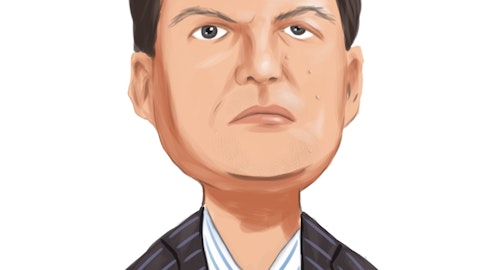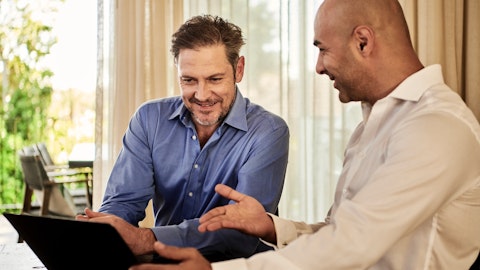Peter Kern: Yes, I mean I’d say broadly working backwards I don’t think their investments of time calories to be made. But in terms of investments of money and capital, I think we’re on the other side of that hill and we expect to be able to do things more efficiently going forward. But if you talk about One Key and the product itself as I say like, One Key is a great way to create stickiness within our environment, but you might have heard me mention that we’ve we finally migrated all our CRM virtually 100% of our CRM and the brands to our new unified messaging platform that platform allows us to do things much faster to communicate with customers. So whether we have One Key benefits whether we have new, new offerings in One Key whether there are One Key bonuses, all the things we can use to merchandise and keep people and use One Key to be the glue that keeps members sticky.
And remember, member members get more than just One Key They get member discounts in the product and in many of the products were expanding that every day We now have deeper discounts for silver and gold. And so there’s just a lot of things to keep them in, but it’s important to be able obviously to communicate with them in the most modern ways and that’s what our new single messaging platform allows us to do. And then you add on to that, this kind of goes to the broader point as we’ve woven, we’ve improved the products, we’ve added new features, but I say you said what am I most excited about? It’s really machine learning and AI plumbed into essentially the entire product experience, because what that gets you is effectively a personalized experience for every customer and that’s from the front end basic shopping flows as I mentioned to post-booking to CRM and everything else and the more we can connect and now that we have a single identity for our customers, and now that we can use that data to give them the best experience we’re seeing some of our best wins now just as algorithms improve and learn and new versions come out whether it’s to optimize pictures or content or what you see in what order what filters are applied like those kinds of things that we can now do at scale That is what I’m most excited about.
I mean, we have lots of cool features. we have all kinds of things going on to improve the air shopping experience the package shopping experience. You name it, but really at its core. I think having plumbed in the AI and ML we can now do so much more, so much more quickly and it will feel to the consumer like a much more customized experience that’s relevant to them. And I think that’s inherently sticky in a way that frankly travel products have not historically been in our space. So that’s what I’m most excited about.
Eric Sheridan: Thank you, Peter.
Operator: Thank you. Our next question comes from Lee Horowitz from Deutsche Bank. Lee please go ahead.
Lee Horowitz: Great. Thanks for the question. First Peter, congrats on your tenure. Thanks again It’s been a crazy couple years and congratulations on all that you’ve accomplished over that time period. Maybe just sticking with Vrbo as we think about it in 2024. I guess one, how do you feel about the overall health of the alternative accommodations industry? Do you think there may be some continued pricing headwinds in say core vacation rental destinations as travel patterns continue to normalize and perhaps some macro weakness plays through? And then secondly, can you provide any thoughts on how the competitive set for Vrbo has evolved over the past couple of years, maybe as you’ve taken your foot off the gas and how maybe this shifting competitive landscape, if it is happening, is informing your strategies to get this business back to humming again? Thanks.
Peter Kern: Yes, sure, Lee, and thanks for your thoughts. It has been a couple of crazy years. I would say a few things. Sort of working backwards, I think, obviously we’ve seen VR continue to be healthy even post pandemic as habits have shifted. However, there’s like VR within VR. So Urban has done better. We are not heavily weighted to Urban. Some of our competitors are. I think that’s what you mean by the evolving landscape. Obviously Airbnb has always been there. Booking has been doing more with that product. Again, largely, as best we can tell, focused and benefiting from the Urban side of VR or alternative accommodations. We’re still squarely situated in our core markets. We haven’t made a big decision to pivot to Urban, but one of the things that’s enabled by all the migrations we’re doing that will come this year, we have a bunch of multi-unit VR inventory on our OTA brands that is not on Vrbo.
And we still have some Vrbo content that is not on our OTA brand. So there’s still opportunity to do more in sharing the inventory we already possess. We’ve had no shortage of finding inventory, and I think housing market issues and other things probably make that macro easier now. It’s really just changing habits. Now, our hedge against renting a mountain house or a beach house is, of course, renting a hotel or resort room as the alternative, and we’ve participated very well in that, and we feel good about our position there. But I think we feel very good about Vrbo. We needed to get the product to a new place. We are now firmly on that journey. I don’t think we gave space to anybody. I think we have a good brand. We have an improving product that I have no doubt will be best-in-class.
And we just have to get back on offense. And again, this is one of those places where you had to take a pause, go slow to go fast. And the slow part always hurts a little, but if you don’t do it, you can never go fast. So we’re in a good spot now, and I think we just have to accelerate out of it. And I don’t worry about the supply situation, and I don’t really think we’re losing ground to other competitors who have some super sticky product. And over time, we should have the stickiest product because our product comes with loyalty, and our loyalty is usable across any travel product. So I think that’s a winning combination. We just got to keep pounding it home now, and now that we have the product to get behind, we will do that.
Lee Horowitz: Helpful, thank you.
Operator: Thank you. Our next question comes from Anthony Post from Bank of America. Anthony, please go ahead.
Anthony Post: Great, thank you. I guess a couple for Julie. You gave us the 11% growth for lodging and 18% for hotels. So we can kind of solve for Vrbo, but can you give us any range of what percent your alternative accommodation nights are or bookings just so we can not have too big of a range there? And then second, last year you were very clear, double digit top and bottom line. I think you said similar growth on the top line and then margin improvement. I mean, is that kind of saying double digit for both, or do you want to clarify kind of the growth rates at all? Thank you.
Julie Whalen: Sure. On the first one, we haven’t, and I think recently we haven’t given out what percent is our Vrbo piece of the business, but I think once we bought the company, there was some, obviously numbers that were provided at that time. You can do some extrapolation on the growth rate and get pretty close probably. So I don’t think there’s anything else that we would give out today from a disclosure perspective on that front. On the guidance perspective, we basically have said, as you alluded to, that we are planning to grow relatively in line with our growth rates from this year, which is about, call it 9.5%, 10% in GBV [ph] and 10% on revenue. And then we said with margin expansion relatively in line, which we’re calling about 75 basis points for expansion this year. So that’s how I would take it. I mean, relatively in line to us, plus or minus 100 or so basis points. But that’s how I’d think about it, that it’s both for GBV and revenue.
Anthony Post: Great. Thank you.
Operator: Thank you. Our next question comes from Jed Kelly from Oppenheimer. Jed, please go ahead.
Jed Kelly: Yes. Hey, thanks. Thanks for taking my question. Just going on to your overall marketing strategy, just by watching TV, I still see you’re still marketing to a lot of the brands, Hotels.com, Expedia. And do you start to pivot those brands more into One Key? Can you talk about that? And then can you just talk about your comments on streamlining expenses sort of what’s the strategy behind that move? Thank you.
Peter Kern: Yes, sure. Thanks, Jed. So on the marketing front, yes. In the U.S., you will see all the brands advertised used to be far more brands. We’re down to those core three and we believe in those three. I think, we’re still trying to find the balance between, can they be advertised as one or do they need to be advertised as three? And what is the best way to penetrate? So I would think of that as sort of a we’re on our own learning journey about what we can do, how we can help people see them as a family of products that work together. And we continue to try to optimize, be it on television, which is what you’re seeing or in programmatic, or frankly, even in meta search and so forth. So we’re constantly working to see what the optimum way to drive those are.
But I will say in the rest of the world, we have made very conscious decisions of where we will maintain one brand or if we think it’s worth it, two or three brands and what we will do there. And we will lean heavily into a high bar for there to be more than one. There has to be real brand affinity and other things that are driving that continuation of the second brand. So especially now that conceivably any of our brands could have all or any lines of business and that’s not that hard for us to do. So the opportunity to take, for example, a market that is a predominant Hotel.com market and potentially add car and air and other packages and other things is within our gift now. And so we can make quite different decisions about do we need to be in with Expedia just to have air or something else?
So that’s really a big opportunity for us and allows us to simplify how we think about those decisions and in some ways not replicate some of the complexity we’ve made for ourselves over the years. So that’s a work in progress. But, all those things are effective and we’re working to optimize all the time on the best way to communicate that. Maybe Julie can say something about the…





